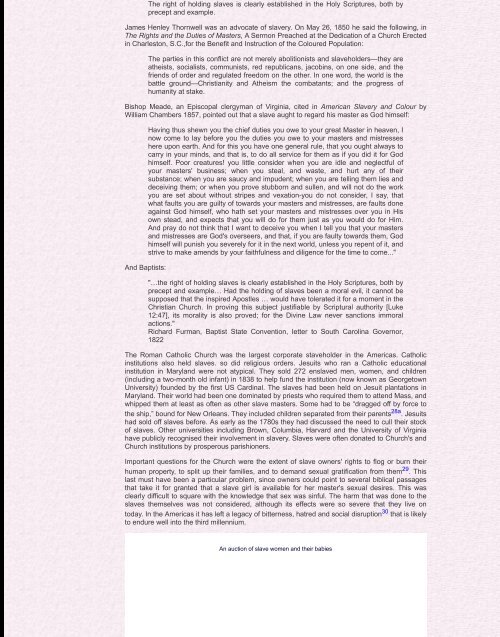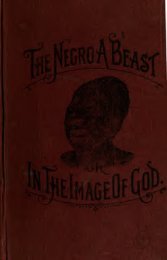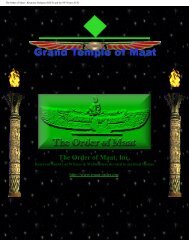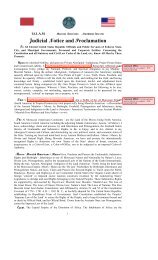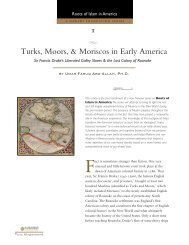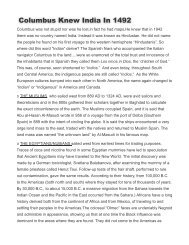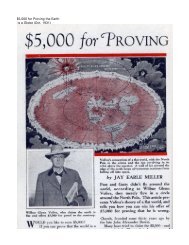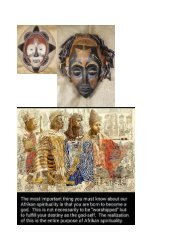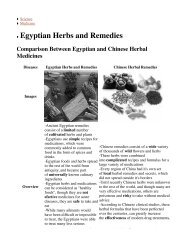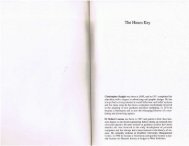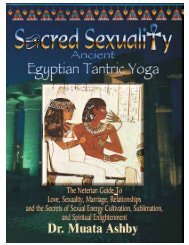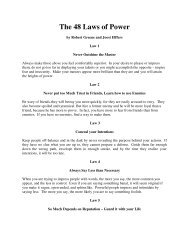Christian Slavery - Bad News About Christianity
You also want an ePaper? Increase the reach of your titles
YUMPU automatically turns print PDFs into web optimized ePapers that Google loves.
The right of holding slaves is clearly established in the Holy Scriptures, both by<br />
precept and example.<br />
James Henley Thornwell was an advocate of slavery. On May 26, 1850 he said the following, in<br />
The Rights and the Duties of Masters, A Sermon Preached at the Dedication of a Church Erected<br />
in Charleston, S.C.,for the Benefit and Instruction of the Coloured Population:<br />
The parties in this conflict are not merely abolitionists and slaveholders—they are<br />
atheists, socialists, communists, red republicans, jacobins, on one side, and the<br />
friends of order and regulated freedom on the other. In one word, the world is the<br />
battle ground—<strong>Christian</strong>ity and Atheism the combatants; and the progress of<br />
humanity at stake.<br />
Bishop Meade, an Episcopal clergyman of Virginia, cited in American <strong>Slavery</strong> and Colour by<br />
William Chambers 1857, pointed out that a slave aught to regard his master as God himself:<br />
And Baptists:<br />
Having thus shewn you the chief duties you owe to your great Master in heaven, I<br />
now come to lay before you the duties you owe to your masters and mistresses<br />
here upon earth. And for this you have one general rule, that you ought always to<br />
carry in your minds, and that is, to do all service for them as if you did it for God<br />
himself. Poor creatures! you little consider when you are idle and neglectful of<br />
your masters' business; when you steal, and waste, and hurt any of their<br />
substance; when you are saucy and impudent; when you are telling them lies and<br />
deceiving them; or when you prove stubborn and sullen, and will not do the work<br />
you are set about without stripes and vexation-you do not consider, I say, that<br />
what faults you are guilty of towards your masters and mistresses, are faults done<br />
against God himself, who hath set your masters and mistresses over you in His<br />
own stead, and expects that you will do for them just as you would do for Him.<br />
And pray do not think that I want to deceive you when I tell you that your masters<br />
and mistresses are God's overseers, and that, if you are faulty towards them, God<br />
himself will punish you severely for it in the next world, unless you repent of it, and<br />
strive to make amends by your faithfulness and diligence for the time to come..."<br />
"…the right of holding slaves is clearly established in the Holy Scriptures, both by<br />
precept and example… Had the holding of slaves been a moral evil, it cannot be<br />
supposed that the inspired Apostles … would have tolerated it for a moment in the<br />
<strong>Christian</strong> Church. In proving this subject justifiable by Scriptural authority [Luke<br />
12:47], its morality is also proved; for the Divine Law never sanctions immoral<br />
actions."<br />
Richard Furman, Baptist State Convention, letter to South Carolina Governor,<br />
1822<br />
The Roman Catholic Church was the largest corporate staveholder in the Americas. Catholic<br />
institutions also held slaves. so did religious orders. Jesuits who ran a Catholic educational<br />
institution in Maryland were not atypical. They sold 272 enslaved men, women, and children<br />
(including a two-month old infant) in 1838 to help fund the institution (now known as Georgetown<br />
University) founded by the first US Cardinal. The slaves had been held on Jesuit plantations in<br />
Maryland. Their world had been one dominated by priests who required them to attend Mass, and<br />
whipped them at least as often as other slave masters. Some had to be “dragged off by force to<br />
the ship,” bound for New Orleans. They included children separated from their parents 28a . Jesuits<br />
had sold off slaves before. As early as the 1780s they had discussed the need to cull their stock<br />
of slaves. Other universities including Brown, Columbia, Harvard and the University of Virginia<br />
have publicly recognised their involvement in slavery. Slaves were often donated to Church's and<br />
Church institutions by prosperous parishioners.<br />
Important questions for the Church were the extent of slave owners' rights to flog or burn their<br />
human property, to split up their families, and to demand sexual gratification from them 29 . This<br />
last must have been a particular problem, since owners could point to several biblical passages<br />
that take it for granted that a slave girl is available for her master's sexual desires. This was<br />
clearly difficult to square with the knowledge that sex was sinful. The harm that was done to the<br />
slaves themselves was not considered, although its effects were so severe that they live on<br />
today. In the Americas it has left a legacy of bitterness, hatred and social disruption 30 that is likely<br />
to endure well into the third millennium.<br />
An auction of slave women and their babies


